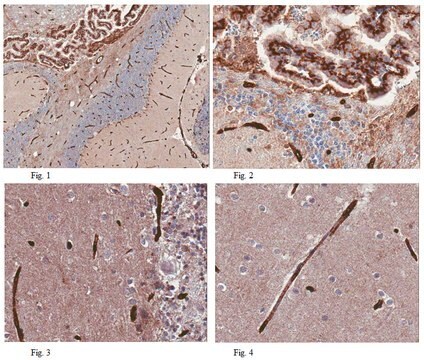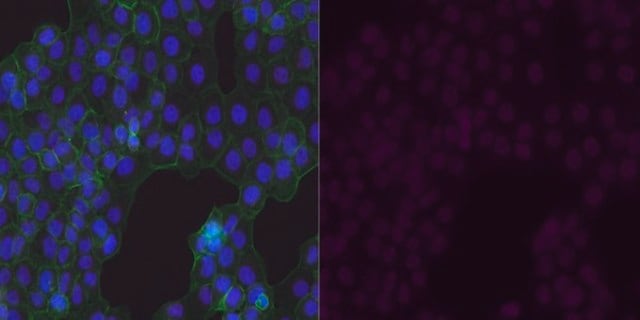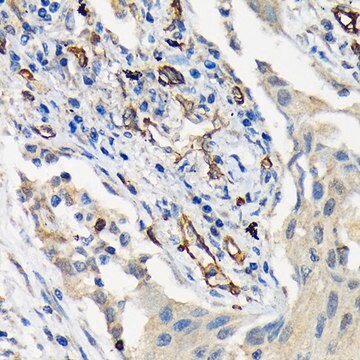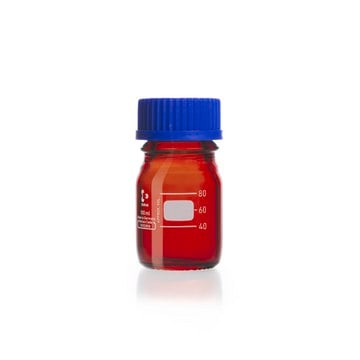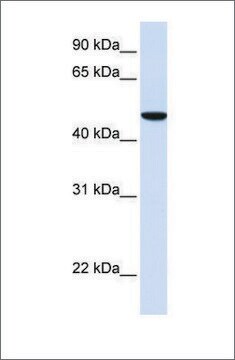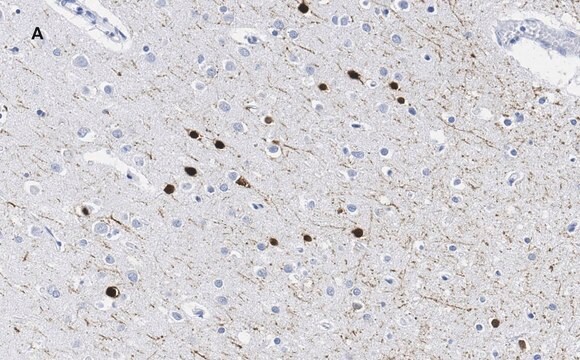ZRB071401
Anti-GLUT-1 Antibody, CT, clone 16D21, ZooMAb® Rabbit Monoclonal

recombinant, expressed in HEK 293 cells
Synonym(s):
Glucose transporter type 1erythrocyte/brain, HepG2 glucose transporter, Solute carrier family 2 facilitated glucose transporter member 1
About This Item
IF
IHC
WB
monoclonal
immunofluorescence: suitable using 1:100
immunohistochemistry: 1:100-1:250
western blot: suitable using 1:1,000
Recommended Products
biological source
rabbit (recombinant)
Quality Level
recombinant
expressed in HEK 293 cells
conjugate
unconjugated
antibody form
purified antibody
antibody product type
primary antibodies
clone
16D21, recombinant monoclonal
monoclonal
product line
ZooMAb® learn more
form
lyophilized
mol wt
calculated mol wt 54.08 kDa
observed mol wt ~52 kDa
species reactivity
human, mouse
species reactivity (predicted by homology)
bovine, rat
packaging
antibody small pack of 25 μL
greener alternative product characteristics
Waste Prevention
Designing Safer Chemicals
Design for Energy Efficiency
Learn more about the Principles of Green Chemistry.
enhanced validation
recombinant expression
Learn more about Antibody Enhanced Validation
sustainability
Greener Alternative Product
technique(s)
immunocytochemistry: 1:100-1:250
immunofluorescence: suitable using 1:100
immunohistochemistry: 1:100-1:250
western blot: suitable using 1:1,000
isotype
IgG
UniProt accession no.
greener alternative category
, Aligned
shipped in
ambient
storage temp.
2-8°C
target post-translational modification
unmodified
Gene Information
human ... SLC2A1;GLUT1(6513)
General description
Each ZooMAb antibody is manufactured using our proprietary recombinant expression system, purified to homogeneity, and precisely dispensed to produce robust and highly reproducible lot-to-lot consistency. Only top-performing clones are released for use by researchers. Each antibody is validated for high specificity and affinity across multiple applications, including its most commonly used application. ZooMAb antibodies are reliably available and ready to ship when you need them.
Learn more about ZooMAb here.
Specificity
Immunogen
Application
Immunofluorescence Analysis: A 1:100 dilution from a representative lot detected GLUT-1 in human placenta frozen sections.
Immunocytochemistry Analysis: A 1:100-250 dilution from a representative lot detected GLUT-1 in NIH3T3 and HepG2 cells.
Target description
Physical form
Reconstitution
Storage and Stability
Legal Information
Disclaimer
Not finding the right product?
Try our Product Selector Tool.
Storage Class Code
11 - Combustible Solids
WGK
WGK 1
Flash Point(F)
Not applicable
Flash Point(C)
Not applicable
Choose from one of the most recent versions:
Already Own This Product?
Find documentation for the products that you have recently purchased in the Document Library.
Customers Also Viewed
Articles
Learn about the hallmarks of cancer and find reliable ZooMAb® recombinant antibodies to study them, conveniently organized by cancer hallmark.
Learn about the hallmarks of cancer and find reliable ZooMAb® recombinant antibodies to study them, conveniently organized by cancer hallmark.
Learn about the hallmarks of cancer and find reliable ZooMAb® recombinant antibodies to study them, conveniently organized by cancer hallmark.
Learn about the hallmarks of cancer and find reliable ZooMAb® recombinant antibodies to study them, conveniently organized by cancer hallmark.
Our team of scientists has experience in all areas of research including Life Science, Material Science, Chemical Synthesis, Chromatography, Analytical and many others.
Contact Technical Service


